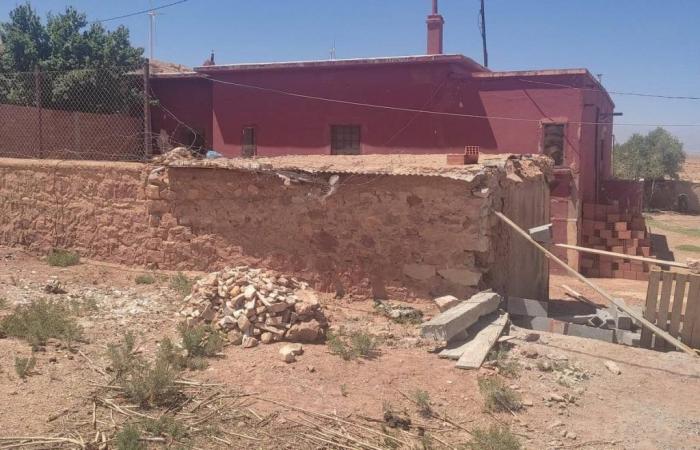In a region marked by a rich mining past, a passionate project is born before collapsing under the blows of the local authorities. Mohamed Mouhib, doctor, writer, collector, and community actor, talks about his museum in Mibladen, a town steeped in mining history in the province of Midelt. Today destroyed, the Dr Mouhab museum nevertheless marked the history of Midelt. The messages of encouragement and recognition have undoubtedly replaced the sadness which surrounded the destruction of what had, if anything, given life to the locality.
Last Thursday, June 6, the local authorities proceeded to destroy the site of the museum that Mohamed Mouhib was in the process of setting up in a ruined villa, located in the former mining village of Mibladen, about 18 kilometers north- east of Midelt. Mohamed Mouhib, doctor, writer, collector, associative actor and scholar emblematic of the Jbel El-Ayachi region, undertook to transfer his precious collection of rare pieces to this new space, initially located in his residence in Midelt.
The total investment in this project amounted to approximately 300,000 dirhams, a considerable sum having made it possible to acquire treasures of inestimable scientific and cultural value. These included a three-billion-year-old stromatolite, prehistoric fossils as well as a variety of rare crystals such as vanadinite and cerussite, all discovered on Moroccan soil. However, these exceptional pieces constituted only a fraction of the treasures contained in Mohamed Mouhib’s collection, which also included an abundant source of documentary information on similar discoveries across the kingdom.
The destruction of the construction site caused not only the material loss of these precious artifacts, but also sparked deep outrage within the local community and beyond. The exact motivations behind this action by local authorities remain unclear, plunging Mohamed Mouhib and his supporters into uncertainty as to the steps to take to recover and preserve this unique heritage.
In 1981, Dr Mouhib, then recently appointed doctor in the region, discovered a burning passion for fossils and minerals. This fascination led him to accumulate a collection of more than 700 pieces, carefully kept in his home.
“The Mibladen Fossil and Mineral Museum, located in a former mining village, is the fruit of my passion and dedication,” he confides. His goal: to transform this passion into a true sanctuary dedicated to the mineralogy of the region, thus offering an educational and tourist showcase to a village in the grip of economic stagnation since the closure of the mines.
Destruction, a blister on the project
Unfortunately, Mouhib’s dream was brutally thwarted by the local authorities, who, citing a lack of authorization, ordered the destruction of the museum, which was barely under construction. This decision, according to Mouhib, goes beyond the simple administrative framework and points to hidden favoritism. “It is striking to note that a neighbor, a major seller of minerals, was able to build without authorization, without ever being bothered by the authorities,” he says. This confusing neighborhood raises questions for Michel about the integrity and real reasons for this administrative decision. Indeed, the workers who participated in the construction of his project had also worked for this person.
Prior to the start of the work, Mouhib had scrupulously prepared and presented a file to the governor, requesting his support for this cultural project. “The letter remained unanswered, as did the one where I asked him to postpone the demolition,” he laments. Administrative indifference and the uncompromising speed of the demolition left Mouhib distraught, after a 24-hour ultimatum imposed by local authorities, during which his appeals went unanswered.
Read also: Electric energy: 3% increase in production at the end of April
The financial repercussions of this destruction are colossal. Mohamed Mouhib is waiting for an expert’s report to precisely quantify the extent of the losses, but the impact is already deeply felt. In February 2024, a formal request for the construction of the museum was submitted to the governor, which remained without a formal response. Despite everything, work began in May, driven by the hope and desire to preserve an essential part of the regional heritage.
Mibladen, internationally recognized for its rare and prized minerals, sees its cultural and scientific heritage in danger. “My goal was to conserve this national heritage and stimulate tourism in this neglected locality,” explains Mouhib. The destruction of this potential museum space represents an immeasurable loss for the region, depriving future generations of a valuable educational venue and a major tourist attraction.
Cultural heritage in Morocco, a half-hearted safeguard
Mohamed Mouhib’s vision extends beyond Mibladen, embracing the reality of cultural heritage in Morocco as a whole. It underlines the considerable efforts of His Majesty to promote museums through the creation of dedicated organizations. “There is real enthusiasm for preserving our national heritage,” he admits. However, Mouhib observes with regret that this desire struggles to penetrate local strata, particularly in remote areas of the country. “Local authorities, especially in deep Morocco, show little or no interest in this sector,” he concludes with a note of bitterness.
To give more importance to Moroccan museums and truly preserve cultural heritage, Mohamed Mouhib calls for increased awareness and greater involvement of local authorities. He campaigns for administrative reforms that would facilitate private initiatives while guaranteeing rigorous and equitable protection of the country’s cultural and historical treasures.
The destruction of the Mohamed Mouhib museum in Mibladen raises crucial questions about the preservation of heritage and the adaptation of cultural policies in less developed regions. Despite this obstacle, Mouhib remains driven by the flame of passion and an unwavering commitment to the culture and history of Midelt.
Unanimous recognition to the son of Midelt
Following the destruction of his museum, Mohamed Mouhib delivered a poignant testimony reflecting on the beginnings of his project. He underlines the sad outcome in these terms: “In the midst of celebrating Museum Night in Rabat, a project aimed at breathing new life into the mining village of Mibladen (Midelt) was destroyed by the authorities. This decision further obscures the future of a community already weakened by the cessation of mining activity in the 1980s.” It highlights the lack of interest of local authorities in the heritage of this old mine, emphasizing that this is the first and only demolition carried out by the authorities in this village since the closure of the mine. The restoration work carried out without authorization illustrates the ambiguous situation of this old mine, which still seems to be under the influence of the former foreign operating company, Pena Roya.
Comments on social media were the scene of numerous messages full of empathy for the attention of Mohamed Mouhib. Anouar addresses a scathing appeal to the authorities, deploring that “this demolition highlights the structural gaps in governance and authority in this region, where constructive and admirable initiatives coming from individuals or organizations fighting against mediocrity and chaos are hindered and repressed… a clear illustration of ignorance and contempt for cultural heritage and its crucial role in the development of territorial projects and future territories… territories which promote freedom of expression, the development of territorial resources, democracy and concrete socio-economic development rather than sterile speeches and rent…”
Hassan Mamoun drives the point home by emphasizing that “rather than obstructing this voluntary initiative with high added value for the community of Mibladen and the entire region, decision-makers should have facilitated and supported this project, by putting in place all necessary measures to ensure its success. Thus a museum could have emerged bringing new life to this declining site but rich in socio-economic and cultural potential, in homage to its glorious past on these same levels. » He concludes with a message of unwavering support for Dr. Mouhib: “Doctor, you have our full consideration and our unconditional solidarity. »
Finally, Salah addresses poignant words to Midelt’s child, Dr. Mouhib: “You beautified and enlightened Midelt, little Paris. Now it’s time for Midelt to return the favor. »






